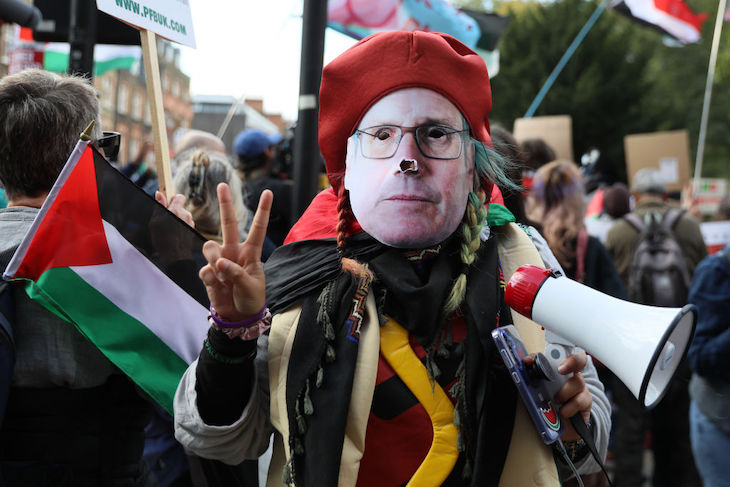Keir Starmer has justified Britain’s declaration of Palestinian statehood by insisting that it will keep open the path to a two‑state solution and ultimately lead to peace. He has emphasised that Hamas could play no role in such a state, and seems to assume the move would position Britain as a key player in shaping the future of the Middle East. Is any of this accurate?
Hamas welcomed the move, as did Husam Zumlot, the PLO representative in London, who went on television to say that Starmer’s declaration (made in concert with Canada and Australia) was simply recognition of an already existing fact. He even described historic Palestine as ‘the cradle of civilisation’ and ‘the birthplace of Christianity’. Such assertions illustrate how this recognition risks becoming part of a broader collective delusion. Just as our age has been browbeaten into accepting claims that a woman can have a penis, repeated endlessly by liars and the self‑deluded until it takes on a veneer of truth, so too are we now told to recognise as fact the existence of a Palestinian state. In both cases, politicians parrot out of fear what a determined minority insists upon, and in both cases the emperor is not merely naked but praised for wearing garments that do not exist at all.
The reality was laid bare the very evening of Starmer’s declaration. In Gaza, Hamas staged a public execution, shooting three men accused of collaboration with Israel. Hundreds of Palestinians crowded the square, filming, photographing the corpses, and shouting ‘Allahu Akbar’. The images were swiftly circulated across Hamas’s Telegram channels, and watched by hundreds of thousands. Their message was unmistakable: Hamas rules ‘Palestine’, and terror remains its currency. That is the state Britain has chosen to recognise.
Far from elevating Britain on the world stage, the move to recognise Palestine diminishes it. The United States and Israel both opposed it. By acting apart from two of its closest allies, Britain has weakened its influence. Unless, perhaps, it forms part of a wider calculation, part of a cunning, Trumpian plan. Only days earlier, Trump held a private one‑on‑one meeting with Starmer at Chequers where they discussed Israel. That meeting immediately raised speculation that Trump may have pressed Starmer on his stance, or that the UK’s recognition of Palestine was quietly factored into a broader strategy. New reports indicate that Trump will host a select group of Arab and Muslim leaders on the sidelines of the UN General Assembly in New York this week, to discuss ways to end the Gaza war. Was Britain’s move anticipated within a Trump‑Netanyahu framework, calculated to remove Britain from obstructing real diplomacy and to keep the focus away from the meddling press and noisy protest movements? While this would be typical of the Trump playbook, it remains only speculation.
Britain’s recognition also teaches Hamas the wrong lesson. It tells the terror group, and all who might emulate it, that brutality is rewarded. It tells the world that maximum violence, kidnapping, and massacre open the door to statehood, not compliance with international norms. It tells Israel that Britain will ignore its security needs and long alliance.
The Foreign, Commonwealth and Development Office wasted no time in redrawing its official maps. Overnight, its pages on Israel were altered to show the whole of Judea and Samaria and the Gaza Strip marked as ‘Palestine’, bulldozing away the hard-negotiated distinctions of the Oslo Accords which carefully divided Areas A, B and C to acknowledge both Israeli and Palestinian control in different zones. This casual redrawing, a sort of Skyes-Picot Agreement done in Microsoft Paint, sweeps aside years of negotiation with the click of a mouse, further reinforcing the perception that Britain is indulging in crude symbolism rather than cautious statesmanship.
The implications are grave. It achieves the very opposite of what Starmer claims to want. For Israel, this will likely encourage a firmer assertion of sovereignty over Judea and Samaria to build a defensive barrier against the phantom state becoming a dangerous reality. For Palestinians, it removes any incentive to acknowledge the difficult truth, or to reform their corrupt and terror encouraging leadership. For jihadists elsewhere, it is proof that terror works. The recognition prolongs the war, delays the release of hostages, emboldens Hamas, and pushes peace further out of reach. Above all, it makes Britain appear weak and detached from reality.
This decision is not rooted in principle, but in politics
Meanwhile, questions remain about the Prime Minister’s vague promises of sanctions against Hamas. Will he truly sanction Hamas leaders who were long ago welcomed into Britain and even granted citizenship? Will he move against British charities long suspected of funnelling funds to Hamas? Will he confront the revelations that British diplomats continued to reassure Palestinians they would still deal with Hamas even after its formal proscription? For now, there is only rhetoric, not action. This is bad diplomacy: Britain gave everything (from what was not its own to give) and received nothing in return. The worst kind of deal.
But then, this decision is not rooted in principle, but in politics. Starmer’s leadership is under strain, his polling numbers plummeting, his handling of illegal immigration mocked, his US ambassador humiliated into oblivion, his deputy prime minister removed for not paying her taxes, and his party conference imminent. He needed a ‘win’ to present to his base, regardless of its consequences. The price of his point-scoring will not be paid in Liverpool or London, but in Gaza and Israel. But those who suffer have no vote in the election he fears losing, so who cares?
Ultimately, recognition of a Palestinian state under these conditions is not a step towards peace. Quite the opposite. What Starmer has presented as progress is, in fact, a retreat into symbolism and self-deception. And it is against the wishes and interests of the British public.









Comments